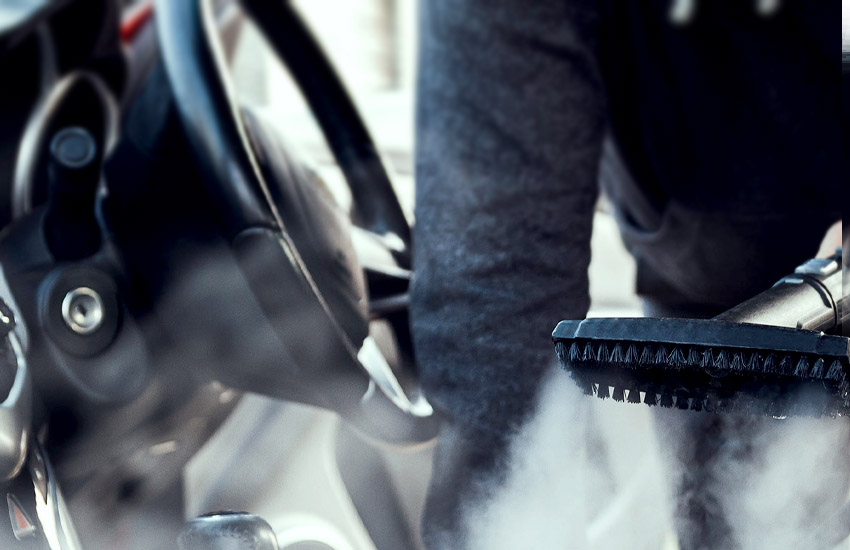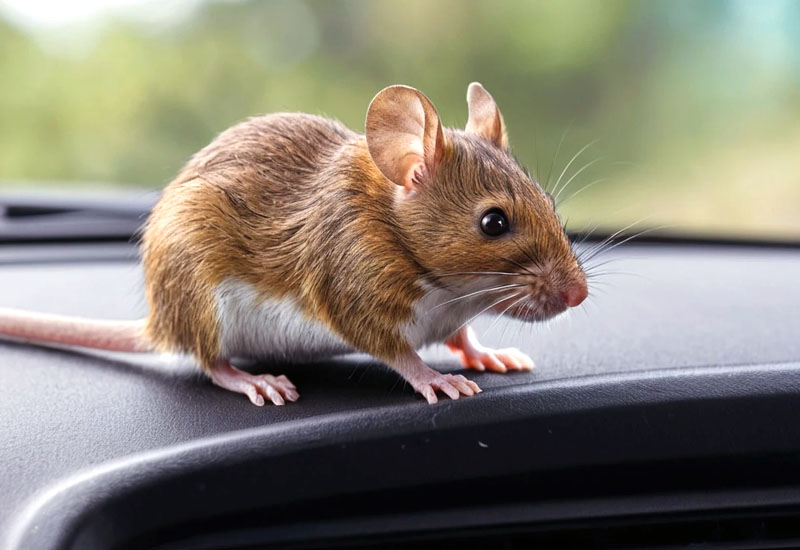Mice can cause a lot of trouble if they get into your car. Not only can they chew through wires and leave droppings, but they also can leave behind a terrible smell that lingers long after they are gone. If you find yourself dealing with the unpleasant odor of mice in your vehicle, don’t worry. In this guide, you will learn how to eliminate mouse smell from your car effectively.

Understanding the Source of the Smell
To tackle the issue of mouse smell, it is essential first to understand what causes it. Knowing the source will help you approach the problem more effectively.
What Causes Mouse Smell?
Mice leave behind urine and droppings wherever they go. The urine has a strong, pungent smell that can be hard to eliminate. The droppings can also decay and create a foul odor over time. In addition to these, if mice make a nest in your car, the nesting materials (which can include food scraps) can contribute to the smell.
Where Do Mice Hide in Cars?
Mice tend to look for warm, hidden spaces to nest. In cars, they often hide in the engine compartment, under seats, or inside the trunk. Checking these areas is crucial if you want to remove the source of the smell effectively.
Identifying Mouse Infestation
Before you can eliminate the smell, you need to confirm that mice have been in your car. Look for signs of droppings, chewed materials, or nesting materials. You might also notice a strange smell that seems out of place. If you notice these signs, it’s likely that you have a mouse problem.
The Dangers of Mouse Smell
Mouse smell is not just unpleasant; it can also be unhealthy. The smell can cause allergies or respiratory issues, especially in people sensitive to strong odors. Moreover, the droppings and urine can carry harmful bacteria and diseases. Thus, addressing this issue promptly is essential for your health and well-being.
Why Traditional Cleaning Methods May Not Work
Many people try to mask the smell with air fresheners or regular cleaning products. However, these methods often only cover up the odor rather than eliminate it. It is vital to use specific techniques and products designed to tackle the root cause of the smell for effective results.
The Importance of Quick Action
The longer you wait to address mouse smell in your car, the more difficult it can become to eliminate. The odor can seep into the fabric and materials of your car, making it harder to remove. Taking action quickly is essential to prevent the smell from becoming a permanent part of your vehicle.

Steps to Eliminate Mouse Smell
Now that you understand the source of the smell, let’s explore the steps you can take to eliminate it effectively.
Step 1: Remove Any Mouse Nests
The first step in eliminating mouse smell is to remove any nests or droppings. Be sure to wear gloves and a mask during this process to protect yourself from any harmful particles.
How to Find Mouse Nests
Look for shredded materials, such as paper, fabric, or insulation. Mice often use these items to create their nests. Check in the engine compartment, under the seats, and in the trunk. Once you locate a nest, carefully remove it with gloves.
How to Dispose of Mouse Droppings
Collect droppings using a damp paper towel to avoid spreading particles into the air. Place them in a sealed plastic bag and dispose of them properly. Clean the area where you found the droppings to prevent further odor.
Cleaning Up Nesting Materials
After removing the nest, it is essential to clean up any leftover materials. Vacuum the area thoroughly to ensure all particles are removed. This will help eliminate the source of the smell.
Step 2: Clean the Affected Areas
Once you have removed the nests and droppings, it’s time to clean the areas where the smell has settled. This step is crucial for effectively eliminating the odor.
Using a Strong Cleaning Solution
Mix a cleaning solution with water and a few drops of dish soap. Alternatively, you can use a specialized cleaner designed to eliminate pet odors. Apply this solution to all surfaces where you found mouse activity.
Scrubbing Surfaces
Use a scrub brush or cloth to thoroughly clean the surfaces. Make sure to scrub all areas, including crevices and corners, where droppings or urine may have collected. This will help break down any lingering odor.
Rinsing and Drying
After scrubbing, rinse the surfaces with clean water to remove any residue from the cleaning solution. Allow the areas to dry completely. Open the doors and windows to help air out the vehicle and speed up the drying process.
Step 3: Deodorizing Your Car
After cleaning, the next step is to deodorize your car. This process will help neutralize any remaining odors that the cleaning might not have fully eliminated.
Using Baking Soda
Baking soda is a natural deodorizer that can help eliminate odors. Sprinkle baking soda on the seats, carpets, and floor mats of your car. Let it sit for a few hours or overnight to absorb any remaining smells.
Using Vinegar Solution
Another effective deodorizer is a mixture of water and vinegar. Mix equal parts of white vinegar and water in a spray bottle. Lightly spray the interior of your car, focusing on areas where you detected the smell. Vinegar will help neutralize odors without leaving a strong scent behind.
Using Activated Charcoal
Activated charcoal is excellent for absorbing odors. Place a few bowls of activated charcoal in your car and leave them for several days. This will help to absorb any lingering smells and leave your car smelling fresh.
Step 4: Air Out Your Car
Air circulation is essential for eliminating smells from your car. It helps remove any lingering odors and ensures a fresh environment.
Opening Windows and Doors
On a sunny day, open all the doors and windows of your car. Letting in fresh air will help dissipate any remaining smells. If possible, park your car in a well-ventilated area for several hours.
Using Fans
If you have access to a small fan, use it to blow fresh air into your car. This will help circulate the air and speed up the odor removal process. Place the fan in an open door or window to maximize airflow.
Running the AC
Running your car’s air conditioning for a while can also help eliminate odors. Make sure the air is set to circulate from inside the car. This can help move the air around and remove any remaining smells.
Step 5: Preventing Future Infestations
Once you have successfully eliminated the mouse smell, it is vital to take steps to prevent mice from returning.
Keeping Food Out of the Car
Mice are often attracted to food. Ensure you do not leave any food or wrappers in your car. Clean up any crumbs or spills immediately to avoid attracting mice.
Parking in a Clean Area
Try to park your car in a clean, open space. Avoid parking near tall grass, weeds, or piles of debris, as these areas can attract mice.
Sealing Entry Points
Inspect your car for any openings where mice might enter. Look for gaps in the engine compartment or around the wheels. Seal these openings with steel wool or silicone sealant to keep mice out.
Step 6: Seeking Professional Help
If the smell persists despite your best efforts, it may be time to seek professional help. Professionals have access to specialized cleaning products and techniques that can effectively eliminate stubborn odors.
Finding a Professional Cleaning Service
Look for a reputable car detailing or cleaning service in your area. Read reviews and ask for recommendations to find a trustworthy provider. A professional can assess the situation and offer tailored solutions for your specific needs.
Considering Pest Control Services
If you suspect that mice are still in your car or surrounding area, contacting a pest control service may be necessary. They can help identify potential nesting areas and provide solutions to eliminate the mice completely.
I hope this guide has provided you with a comprehensive understanding of how to eliminate mouse smell from your car. By following these steps, you can tackle the odor effectively and enjoy a fresh-smelling vehicle again. Remember to take preventative measures to avoid future infestations and maintain a clean car environment.
Are These Questions in Your Mind?
Is it dangerous to breathe in mouse droppings?
Yes, breathing in mouse droppings can be dangerous. They can carry diseases and harmful bacteria that may lead to health issues.
Can I use air fresheners to mask the smell?
While air fresheners can temporarily mask odors, they do not eliminate the source of the smell. It’s essential to clean the area first for effective results.
Do I need special equipment to clean mouse smell?
You don’t need special equipment, but using gloves, masks, and proper cleaning solutions can help ensure your safety and effectiveness during the cleaning process.
Is vinegar safe to use in my car?
Yes, vinegar is safe to use in your car. It is a natural deodorizer and can help eliminate odors without causing damage.
Can I use bleach to remove mouse smell?
It is not advisable to use bleach in your car, as it can damage surfaces and leave behind strong fumes. Opt for milder cleaning solutions.
Do I need to remove the car seats to clean the smell?
It is not necessary to remove the car seats unless the smell is particularly strong in that area. Cleaning around and under the seats can often be sufficient.
Is it normal for my car to smell after a mouse infestation?
Yes, it is common for cars to retain odors after a mouse infestation. Thorough cleaning and deodorizing can help eliminate these smells.
Can mice come back after cleaning?
Yes, if preventative measures are not taken, mice can return. Make sure to keep food out of the car and seal any potential entry points.
Do I need to replace car upholstery if it smells
In most cases, you do not need to replace upholstery. Thorough cleaning and deodorizing can resolve the issue. However, if the smell persists, replacement may be necessary.
Is it necessary to contact a professional?
Contacting a professional may be necessary if you cannot eliminate the smell after your cleaning efforts. They have specialized tools and expertise for stubborn odors.

